
Downingtown is a borough in Chester County, Pennsylvania, United States, 33 miles (53 km) west of Philadelphia. As of the 2020 census, it had a population of 7,898. Downingtown was settled by European colonists in the early 18th century and has a number of historic buildings and structures.

Benjamin Chew was a fifth-generation American, a Quaker-born legal scholar, prominent and successful Philadelphia lawyer, slaveowner, and chief justice of the Supreme Court of the Province of Pennsylvania and later the Commonwealth of Pennsylvania. Chew was known for precision and brevity in his legal arguments and his excellent memory, judgment, and knowledge of statutory law. His primary allegiance was to the supremacy of law and the constitution.
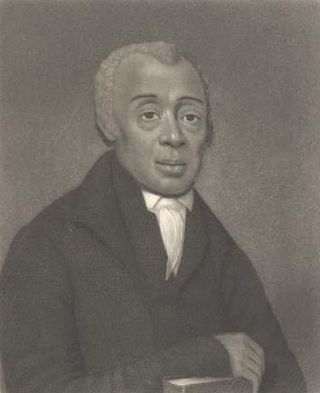
Richard Allen was a minister, educator, writer, and one of the United States' most active and influential Black leaders. In 1794, he founded the African Methodist Episcopal Church (AME), the first independent Black denomination in the United States. He opened his first AME church in 1794 in Philadelphia.

Benjamin Lundy was an American Quaker abolitionist from New Jersey of the United States who established several anti-slavery newspapers and traveled widely. He lectured and published seeking to limit slavery's expansion and tried to find a place outside the United States to establish a colony in which freed slaves might relocate.
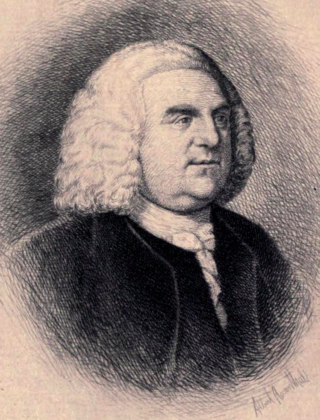
William Allen was a wealthy merchant, attorney and chief justice of the Province of Pennsylvania, and mayor of Philadelphia during the colonial period. At the time of the American Revolution, Allen was one of the wealthiest and most powerful men in Philadelphia. A Loyalist, Allen agreed that the colonies should seek to redress their grievances with British Parliament through constitutional means, and he disapproved of the movement toward independence.

Thomas Ustick Walter was an American architect of German descent, the dean of American architecture between the 1820 death of Benjamin Latrobe and the emergence of H.H. Richardson in the 1870s. He was the fourth Architect of the Capitol and responsible for adding the north (Senate) and south (House) wings and the central dome that is predominantly the current appearance of the U.S. Capitol building. Walter was one of the founders and second president of the American Institute of Architects. In 1839, he was elected as a member to the American Philosophical Society.

Stephen Girard was a naturalized American citizen, philanthropist, and banker of French origin. He singularly saved the U.S. government from financial collapse during the War of 1812 by personally financing the war, and is known to have been the first multi-millionaire in US history. He is estimated to have been the fourth richest American of all time, based on the ratio of his fortune to contemporary GDP. Childless, he devoted much of his fortune to philanthropy, particularly the education and welfare of orphans. His legacy is still felt in his adopted home of Philadelphia and his estate continues to fund philanthropic endeavors to this day.

John Work Garrett, was an American merchant turned banker who became president of the Baltimore and Ohio Railroad (B&O) in 1858 and led the railroad for nearly three decades. The B&O became one of the most important American railroads by the time Garrett died, and Garret would also become a noted philanthropist. He provided crucial support for the Union cause during the Civil War, expanded the railroad to reach Chicago, Illinois, and competed with the Pennsylvania Railroad for access to New York City.

Boyds is an unincorporated community in rural Montgomery County, Maryland, United States, located approximately 27 miles (43 km) north of Washington, D.C. Its ZIP Code is 20841.

The Germantown White House is a historic mansion in the Germantown section of Philadelphia, Pennsylvania. It is the oldest surviving presidential residence, having twice housed Founding Father George Washington during his presidency.
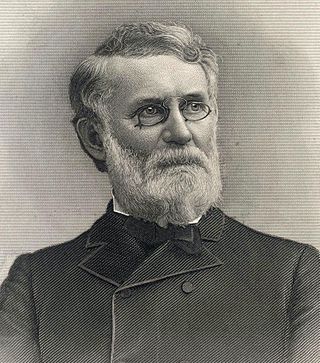
Henry H. Houston was a leading Philadelphia businessman and philanthropist. He worked in iron and transportation industries and invested in oil and precious metal concerns. He sat on boards of a number of railroad organizations and he was trustee of the University of Pennsylvania and Washington and Lee University. He developed Wissahickon Heights, an exclusive community in western Chestnut Hill.
George Ege was a United States Congressman, elected to the House of Representatives from Pennsylvania.

Isaac Norris was a merchant, slave trader and prominent figure in provincial Pennsylvania, including mayor of Philadelphia in 1724.

Beggarstown or Bettelhausen was a small community that was located in the present day neighborhood of Mount Airy in Northwest Philadelphia in the U.S. state of Pennsylvania. It centered primarily along a stretch of relatively flat land along Germantown Avenue roughly between Upsal Street and Gorgas Lane.
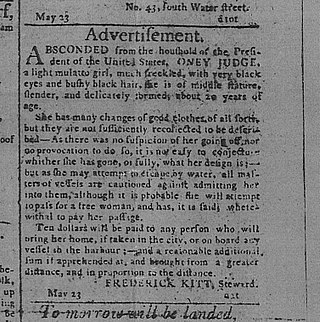
When the Dutch and Swedes established colonies in the Delaware Valley of what is now Pennsylvania, in North America, they quickly imported enslaved Africans for labor; the Dutch also transported them south from their colony of New Netherland. Enslavement was documented in this area as early as 1639. William Penn and the colonists who settled in Pennsylvania tolerated forced unpaid labor. Still, the English Quakers and later German immigrants were among the first to speak out against it. Many colonial Methodists and Baptists also opposed it on religious grounds. During the Great Awakening of the late 18th century, their preachers urged enslavers to free people they enslaved. High British tariffs in the 18th century discouraged the importation of additional enslaved people, and encouraged the use of white indentured servants and free labor.

The Wyck house, also known as the Haines house or Hans Millan house, is a historic mansion, museum, garden, and urban farm in the Germantown neighborhood of Philadelphia, Pennsylvania. It was recognized as a National Historic Landmark in 1971 for its well-preserved condition and its documentary records, which span nine generations of a single family.
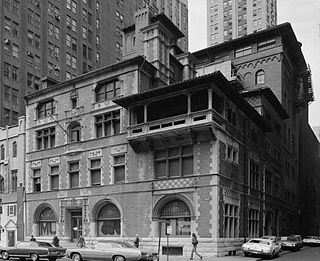
Frank Miles Day was a Philadelphia-based architect who specialized in residences and academic buildings.
Christopher Ludwick, known also as Ludwig, Ludowick, Ludwigg was a German immigrant to Philadelphia, Pennsylvania, and worked as a baker general for the Continental Army during the American Revolutionary War.
Thomas Harrison Montgomery was an American businessman and writer from Philadelphia, Pennsylvania. He was best known for his genealogical and historical writings and his presidency of the American Fire Insurance Company, which he held for over 20 years until his death.
















